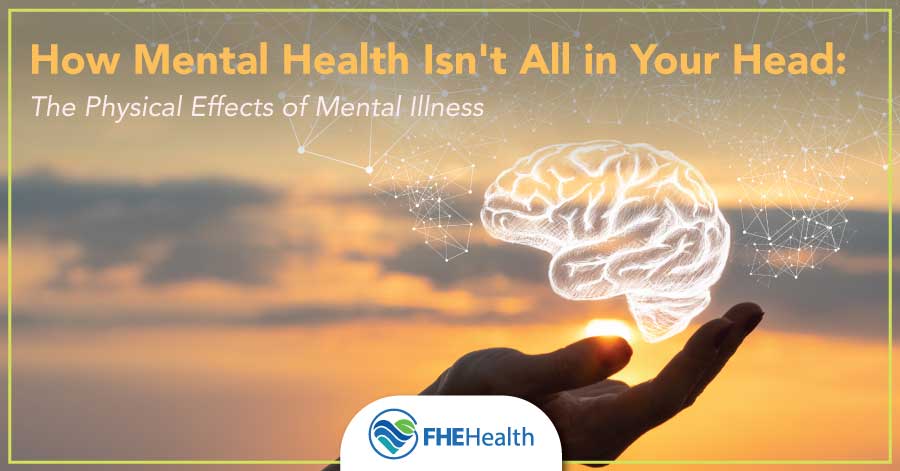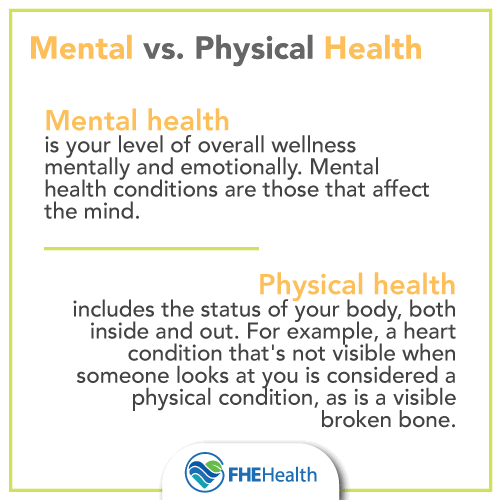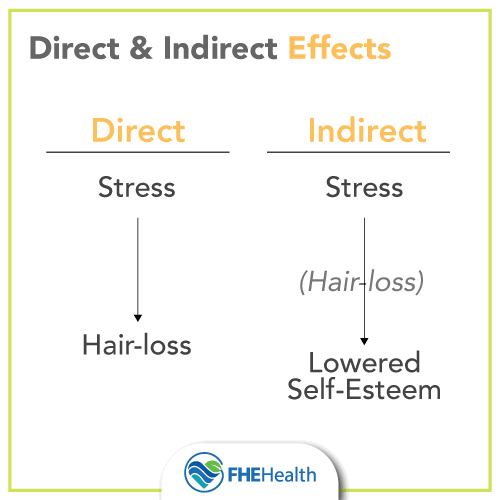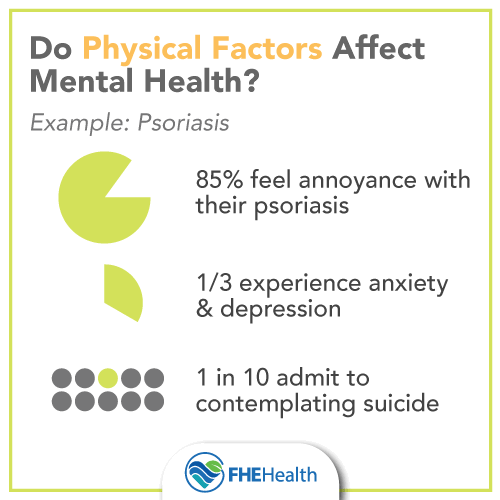
In the health care industry, physical health and mental health have often been treated as distinct concepts. What affects a person’s mental health has no bearing on their physical status, or at least, this has been the prevailing thought.
At FHE Health, we have a unique perspective and a different viewpoint. As a facility that treats addiction, we don’t think there’s such a clear line between the physical and mental aspects of a condition.
Let’s take the concept of withdrawal from drugs or alcohol as an example. Addiction rewires the brain, so many consider addiction to be primarily a mental condition. But when an addict stops using their substance of choice, the sudden change can manifest in extreme physical reactions.
In this piece, we talk about the link between physical and mental conditions. We discuss conditions where this link is undeniable and about ways in which this discovery can inform high-quality treatment for patients at our facilities and in the health care systems around the world.
Understanding Physical and Mental Health
 The concepts of physical health and mental health are very straightforward, making them easy to comprehend.
The concepts of physical health and mental health are very straightforward, making them easy to comprehend.
- Mental health is your level of overall wellness mentally and emotionally. Mental health conditions are those that affect the mind.
- Physical health includes the status of your body, both inside and out. For example, a heart condition that’s not visible when someone looks at you is considered a physical condition, as is a visible broken bone.
The link between physical conditions and those that affect mental health has only been explored more deeply in the past few decades. For example, let’s return to the case of a broken bone, an obvious physical condition. Only now are we starting to look into this type of injury’s effect on a person’s mind.
How Does Mental Health Affect Physical Health?
As more and more studies occur, we’re starting to realize that physical and mental conditions are much more connected than we previously thought.
Even the internal mechanisms that cause mental health issues involve physical properties in the body at a microscopic level. A Harvard Medical School study showed that subjects with a history of depression actually had smaller hippocampi — a physical part of the brain — on average. Even cortisol, a chemical that’s related to stress, is a physical substance that is released throughout the body.
Yes, these are overly complicated explanations of the way in which physical and mental health are intertwined, but they’re indicative of the larger point: Thinking of these two areas of personal wellness as two distinct concepts is an entirely outdated way of conceptualizing the issues.
Different Disorders Have Different Effects on the Body
Schizophrenia is a commonly misunderstood disease, but most people categorize it as a mental illness. That doesn’t explain, however, why numerous studies have found links between schizophrenia and several physical ailments.
According to the UK Mental Health Foundation, a person with schizophrenia has double the risk of death from heart disease and an increased risk of death from respiratory disease by a factor of three.
This phenomenon can be observed outside of diagnosed mental health conditions as well. Researchers from Harvard analyzed upwards of 200 articles and found a correlation between optimism and health. The study suggested that something as simple as positive thinking was a predictor for a decreased risk of cardiovascular trauma.
Indirect vs. Direct Effects
 It’s clear that mental illness can have implications on a person’s physical health, but are these connections direct or indirect?
It’s clear that mental illness can have implications on a person’s physical health, but are these connections direct or indirect?
Direct effects: A direct link would be something like stress causing hair loss, which does happen.
Indirect effects: An indirect link would be depression causing an eating disorder, which is, again, a real link. People with depression report that lower motivation can cause unintended weight gain or loss.
In the above example of people with diagnosed schizophrenia being at a greater risk for other diseases, intuition would suggest that these links are probably due to indirect causes. The Mental Health Foundation confirms that people with schizophrenia and similar disorders don’t typically access the same quality health care as others due to their condition.
For example, the medications used to treat mental health disorders can have vast and varied effects on a person’s physical health and the way they feel overall. This is one reason why people are trying emergent treatments that don’t involve medication for depression, anxiety and other conditions.
Is the Reverse Also True?
 Returning to the UK Mental Health Foundation’s findings, it would appear that not only do mental health conditions affect physical health, but physical ailments can also greatly impact mental and emotional well-being. The foundation uses the example of psoriasis and the way it affects life satisfaction and body image over time. People with skin conditions like psoriasis are thought to be at a higher risk for depression and social anxiety due to their appearance.
Returning to the UK Mental Health Foundation’s findings, it would appear that not only do mental health conditions affect physical health, but physical ailments can also greatly impact mental and emotional well-being. The foundation uses the example of psoriasis and the way it affects life satisfaction and body image over time. People with skin conditions like psoriasis are thought to be at a higher risk for depression and social anxiety due to their appearance.
How Does Treatment Fit Into the Equation
These findings confirm a growing belief in the health care community: Treatment needs to be sophisticated enough to address the physical and mental health implications of a given condition. That’s where FHE Health comes in as a leading provider of care.
FHE Health and a Holistic Approach to Health
Whether we’re treating a mental condition, an addiction or a mix of the two, we approach each patient with the belief that no two patients are alike and no two conditions manifest in the same way in different patients. This gives us the ability to provide more multifaceted care from a holistic standpoint, ultimately elevating the standard of treatment we can provide to our patients.
Are you or a loved one struggling with a mental health condition? FHE Health can walk you through your treatment options. Contact us today for more information.






